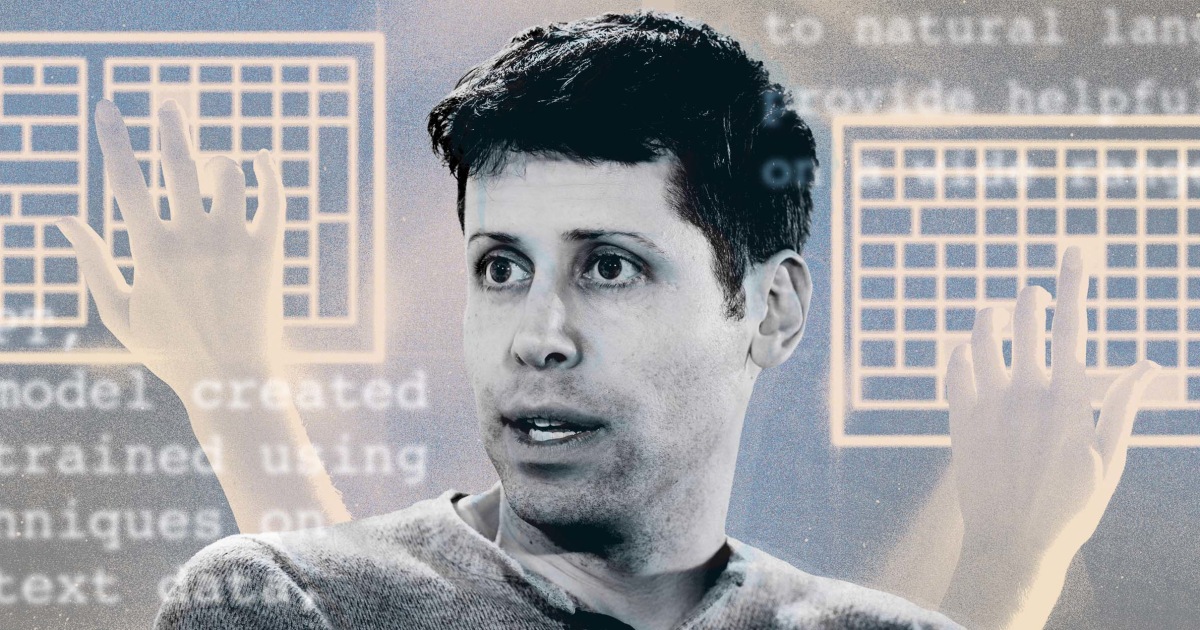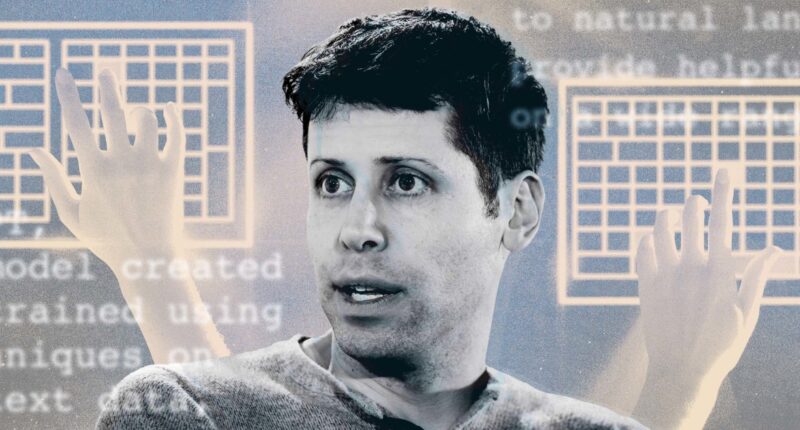
Sam Altman may be tech’s next household name, but many Americans probably haven’t heard of him.
To anyone outside San Francisco, Altman would probably seem like just another young tech CEO. He’s a Stanford University dropout who sold a tech startup years ago for a fortune, and he’s spent the past decade investing and coaching other entrepreneurs. He posts confident and sunny life advice on Twitter and peppers his conversation with references to line graphs.
But in the past three months, Altman, 37, has rocketed to the top of the tech industry’s power rankings on the back of OpenAI. Altman is CEO of the company, which created the viral artificial intelligence chatbot ChatGPT. The technology has caused a panic at rivals such as Google, sparked fears of killer robots and reoriented the direction of tech innovation seemingly overnight.
Move over Elon Musk and Mark Zuckerberg. Silicon Valley may have found its next star CEO.
“He is certainly the man of the hour, which is all the more remarkable given that he’s 37 years old,” said Oren Etzioni, an expert in artificial intelligence who served for years as the head of the Allen Institute for Artificial Intelligence in Seattle.
Altman is already a well-known name for anyone in tech in Northern California, and now he’s poised to become one everywhere else as he and OpenAI accumulate power at the leading edge of artificial intelligence.
OpenAI, based in San Francisco, is still small by tech company standards, with 375 people as of last month, according to an Altman tweet, but the size understates its influence and Altman’s.
Despite a boyish appearance and a wardrobe full of T-shirts and jeans, Altman is a seasoned insider in corporate and political circles. He co-hosted a fundraiser for President Barack Obama in 2014 with then-Yahoo CEO Marissa Mayer, and in 2017, with no real political experience, he considered a run for California governor, according to former San Francisco Mayor Willie Brown. He has attended the elite Sun Valley and Bilderberg business conferences and his friend circle includes tech billionaires such as Peter Thiel, Reid Hoffman and Musk — whose money went to starting OpenAI in 2015.
Before he turned 30, Altman became the head of Y Combinator, a storied startup incubator and investment firm that has helped produce companies such as Airbnb, Dropbox and Reddit. Not afraid of big ideas, he pushed its investments into areas such as nuclear energy.
“Within about three minutes of meeting him, I remember thinking ‘Ah, so this is what Bill Gates must have been like when he was 19,’” Y Combinator co-founder Paul Graham wrote in an essay in 2006, referring to the Microsoft co-founder. Graham later handpicked Altman as Y Combinator CEO.
Alan Kay, a legendary computer scientist, called Altman “a builder of civilizations” and “the greatest thing ever” in a 2016 talk, after Altman pitched him on a new research effort that eventually spawned OpenAI. Kay has advised the firm.
All the adoration has been too much for some other people in the field, including Timnit Gebru, a well-known AI ethics researcher who was forced out at Google in 2020 over a paper she co-wrote that criticized large language models like the ones OpenAI and Google have released.
“I honestly feel like the whole world is going bonkers with the ChatGPT hype,” Gebru said in a post on LinkedIn this month.
Gebru, who did not respond to an interview request, quoted from one of the more outlandishly optimistic claims that Altman has made in the past year. Altman tweeted that “before this decade is out,” cheap energy and advanced AI would be so abundant that “many people will choose to relax all the time” — in short, a utopia where no one needs to work.
Gebru wrote on LinkedIn: “He’s not one to follow for any semblance of truth.”
Neither Altman nor any other OpenAI executives were available for an interview, a spokesperson said.
People who’ve worked with Altman aren’t fazed by the criticism, and they praise his foresight into where tech is headed.
“He has a unique ability to see huge opportunities in new things, and to inspire others to work as hard as he does to make those opportunities real,” Aaron Harris, a former partner at Y Combinator, said in an email.
The hype and panic over ChatGPT show no sign of letting up as technologies like it promise to influence the fields of education, media, tech and more. OpenAI is also behind the image generator DALL-E and its successor DALL-E 2.
ChatGPT faces intense criticism on a few fronts. First, its system is based on information taken from the open internet, which some consider outright theft. Second, it sometimes confidently spits back false information. And third, perhaps paradoxically, it may be so disruptive that OpenAI should not have released it to the public so quickly. Four years ago, OpenAI initially declined to publicly release a full version of GPT-2, a predecessor of ChatGPT, on the basis that it could be misused, including to impersonate others.
And then there’s the idea, fueled by philosophers and pop culture, that AI bots could one day threaten human life.
That all puts Altman into a role that resembles not only a gatekeeper but an explainer-in-chief of technology’s cutting edge, said Margaret O’Mara, a historian of the tech industry and a professor at the University of Washington.
“There’s always this excitement about the smart person who’s explaining this new and mysterious thing to the rest of the world. There’s also excitement when they also seem like a good guy,” O’Mara said.
Altman rarely grants interviews to mainstream media, so he does a lot of his explaining through Twitter, in meetings with Congress, on his blog and in interviews with wealthy investors or journalists who target narrow audiences. Altman has frequently advised people who work in tech to ignore the press, though he did grant an interview this month to Forbes magazine and speak on a New York Times podcast where he disparaged his own creation.
O’Mara, who has written about Silicon Valley’s long line of golden 20- and 30-somethings, which she calls “the whiz kid archetype,” said that Altman had managed to fly under the radar despite his enormous influence in the San Francisco tech scene. Partly that’s because of his circumspect personality, she said.
“He’s not a showman. He’s not like Musk or Thiel. He doesn’t have catchphrases,” O’Mara said.
But he does often share their outlook, she added. “He has the Silicon Valley worldview that’s shared among the small and extremely close group of men who have a lot of power in the valley right now,” she said.
That worldview flared up into controversy in 2017 when Altman wrote a blog post criticizing political correctness, saying tech entrepreneurs were leaving San Francisco over it.
“I realized I felt more comfortable discussing controversial ideas in Beijing than in San Francisco,” he wrote. He followed up two days later to clarify that he wasn’t endorsing hatred, and he has recently been optimistic about the future of San Francisco, calling it “the center of the AI revolution,” despite a “negligent” local government.
Part of Altman’s power comes from the fact that he’s sociable as well as smart. He once told the tech website Re/code, in the days before Zoom calls, that he sometimes spent 6,000 minutes a month talking on the phone — more than three hours a day, on average.
The son of a dermatologist, Altman grew up in the St. Louis area with two brothers, according to a 2016 profile of him in The New Yorker. He helped to transform the culture of his high school when he came out as gay, the magazine said. He now lives in a mansion on San Francisco’s historic Russian Hill, according to regulatory filings.
And although Altman has mostly avoided splashy appearances in the national spotlight, he’s been a familiar face to tech audiences for years. In 2008, as a co-founder of an app called Loopt, he spoke on stage at the unveiling of the iPhone app store. And last week he was the guest of honor at the headquarters of Microsoft, which has signed a partnership deal with OpenAI.
Altman has relished the idea that he and other tech founders are underdogs, despite their wealth and influence.
“You and a small group of rebels get the space to solve an important problem that might otherwise not get solved,” he wrote in a December 2020 blog post titled, “The Strength of Being Misunderstood.”
It’s not clear that Americans want another tech whiz kid in their lives after a series of flameouts. Theranos founder Elizabeth Holmes is headed for prison in April. FTX founder Sam Bankman-Fried is under indictment. And in an NBC News poll last year, voters gave low marks to Musk and Zuckerberg.
But Altman may also fill a vacuum. Tech giants are fighting a perception that they’re stagnating as they’ve laid off thousands of workers. Companies such as Apple and Google, while massively profitable, haven’t wowed consumers with a breakthrough product in years.
And ChatGPT is consistently front page tech news. Even Chinese companies are following OpenAI’s lead in the space, planning their own ChatGPT clones.
ChatGPT, for what it’s worth, doesn’t name Altman as the person most responsible for its birth, despite his title as CEO.
“If we were to name one person who played a key role, it would be Ilya Sutskever,” ChatGPT said in response to a question from NBC News. Sutskever is OpenAI’s chief scientist, a former Google employee and a co-author of an influential 2017 paper on neural networks.
As for where Altman himself is headed, OpenAI’s blossoming partnership with Microsoft may say a lot. Etzioni, the former head of the Allen Institute for Artificial Intelligence, said he takes it as a signal that OpenAI isn’t trying to overtake Microsoft or become a giant standalone company, and so Altman may never be a Bill Gates.
“I think he’s going to be merely a billionaire,” Etzioni said.
Source: | This article originally belongs to Nbcnews.com










